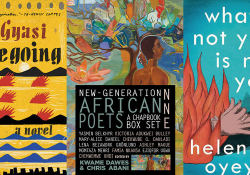A “Clarion Call to Action”: Nine Recommended Books on Climate Change
While the rapidly evolving nature of climate change means that the best sources of current data are online (e.g., United Nations Intergovernmental Panel on Climate Change and National Oceanic and Atmospheric Administration), the following books provide a grounding in the fundamental scientific processes, predicted impacts, and potential solutions for climate change.
The Science of Climate Change
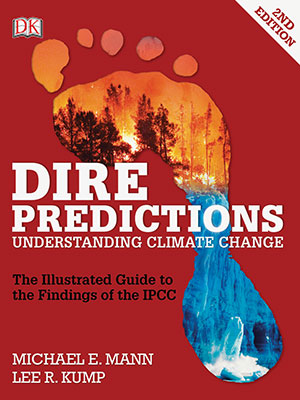 Michael E. Mann & Lee R. Kump
Michael E. Mann & Lee R. Kump
Dire Predictions: Understanding Climate Change
DK, 2nd ed.
Based on the findings of the United Nations Intergovernmental Panel on Climate Change (ipcc), this sumptuously illustrated book elegantly outlines the essential ideas in climate change from scientific basics to practical solutions. Given that it is based on the Fifth IPCC Impact Report and revised in 2015, some of the data, particularly regarding sea level rise, need to be updated in light of the most recent research. Nevertheless, Dire Predictions is still a cogent introduction to the key principles of climate change, and its diverse use of graphics ensures that the critical findings are clear, memorable, and easily accessible to a wide range of readers of different ages.
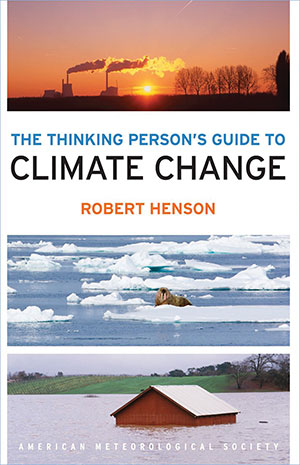 Robert Henson
Robert Henson
The Thinking Person’s Guide to Climate Change
American Meteorological Society
As fake news and climate change skepticism continue to flourish in the US, this essential overview of climate change attempts to separate the wheat from the chaff. It offers a clear description of the tools and techniques used in the scientific analysis of climate change and the current and predicted repercussions for the planet. Additionally, there are discussions of such thorny topics as “Tree Planting: Help or Hindrance?”, “Who Owns the Artic?”, and the global implications of “Outsourcing Emissions,” together with sections on both technological solutions and actions that can be taken by individuals. A particularly engaging section of the Guide is dedicated to examining propaganda, media distortion, and debunking commonly held false beliefs regarding the nature of climate change.
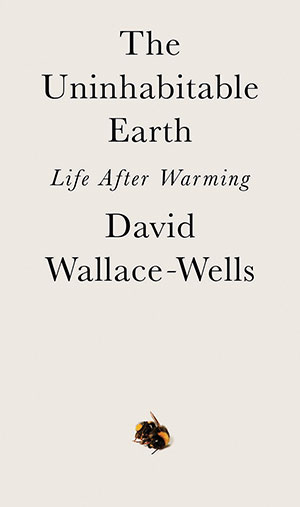 David Wallace-Wells
David Wallace-Wells
The Uninhabitable Earth: Life after Warming
Tim Duggan Books
In gripping, closely argued prose, embracing both history and science with equal grace, Wallace-Wells charts the potential future lying ahead for our species, from climate- change-induced conflict, plague, and economic collapse to the exhaustion of such basic natural resources as clean air and water. This is a deep and unflinching look at the nature of a species that could bring about its own destruction, examining how the structure of our societies and our individual cognitive limitations contribute to short-term thinking, whether in regard to technology, consumption, or even our acts of artistic response. Wallace-Wells incisively articulates the need for broader systems-based analyses as we grapple to understand the multiple ways in which climate change will impact our future.
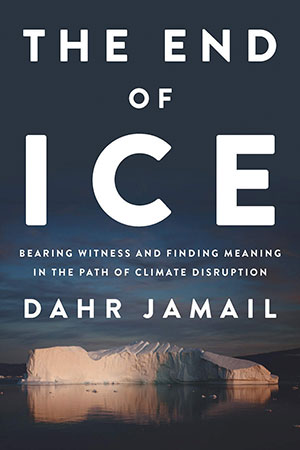 Dahr Jamail
Dahr Jamail
The End of Ice: Bearing Witness and Finding Meaning in the Path of Climate Disruption
New Press
In this lyrical, finely observed portrait of Earth’s changing environments, award-winning war correspondent Dahr Jamail sets out to detail the urgency of the planetary crisis, dovetailing scientific information with firsthand accounts of the lives of those living on the front lines of climate change, from Aleutian fishermen in the Arctic to the indigenous nations of the Amazonian rain forest. This is an intimate, poignant depiction of the interconnections between human cultures, terrain, and climate and how deeply we are shaped by our physical world.
Responses to Climate Change: Artists, Engineers, Innovators, and More
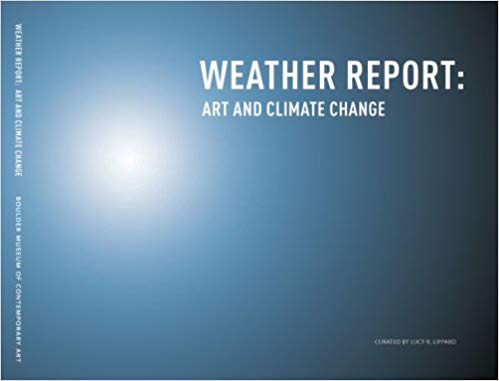 Lucy R. Lippard
Lucy R. Lippard
Weather Report: Art and Climate Change
Boulder Museum of Contemporary Art
Over a decade ago, leading Land artist Lucy Lippard was invited to curate an ambitious exhibition of artistic responses to climate change for the Boulder Museum of Contemporary Art in Colorado. This companion catalog illustrates the intriguing range of tactics and strategies used by the fifty-one featured international artists and makers who not only engaged with the aesthetics of climate change but also used their work to foreground how intergenerational equity and social justice could be impacted by changing environmental conditions. Poring over the striking photographs and accompanying artist statements, we develop a sense of how artists and makers can disrupt mainstream patterns of thinking and open up crucial platforms for interdisciplinary discussion. This seminal book captures a sense of the ground-breaking techniques artists from North America, Europe, and the Middle East were beginning to use in the early part of this century to question environmental complacency, techniques that are still as effective and as urgently needed today.
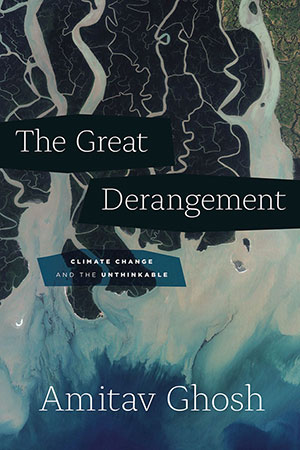 Amitav Ghosh
Amitav Ghosh
The Great Derangement: Climate Change and the Unthinkable
University of Chicago Press
What is the responsibility of the writer with regard to climate change? In this searing Asia-centric discourse on the interconnections between literature, empire, and capitalism, Ghosh casts a spotlight on the role of human imagination and literature in precipitating the climate crisis and determining our continued lack of engagement. Critiquing the largely Eurocentric discussion of the Anthropocene, Ghosh unearths the diverse technological interconnections between East and West that have taken place across history and explores the resulting struggle for dominance between conflicting moral and political models of the environment as played out in the theater of world literature.
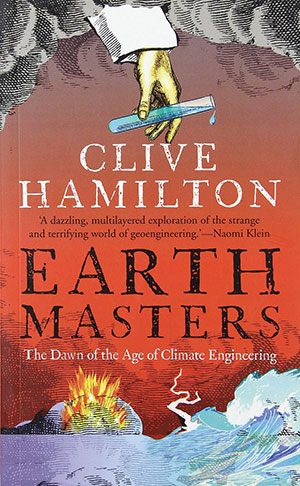 Clive Hamilton
Clive Hamilton
Earthmasters: The Dawn of the Age of Climate Engineering
Yale University Press
Earthmasters is a lucid analysis of the profound economic and ethical issues surrounding climate engineering (deliberate large-scale interventions in the earth’s climate system) including such methods as spraying aerosol sulphates into the atmosphere, modifying the global cloud system, and pumping extensive quantities of alkali into coastal waters. Hamilton, a professor of public ethics, examines the corporate interests supporting many geo-engineering technologies, assesses the shortfall in rigorous testing of such innovations, and evaluates the failure to consider issues of sustainability and long-term ecological fallout. As geo-engineering increasingly comes to the forefront of global political discussions, this seminal book challenges us to take a long, hard look at what it means to take responsible action.
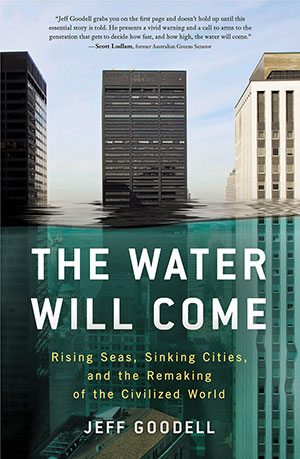 Jeff Goodell
Jeff Goodell
The Water Will Come: Rising Seas, Sinking Cities, and the Remaking of the Civilized World
Little, Brown
With journalistic panache, Jeff Goodell charts the impact of sea level rise on twelve regions around the world and their proposed adaptations, from innovative flood-barrier projects in Venice and land “apartheid” in Lagos to land speculation schemes in Florida and evolving US military planning on the Atlantic seaboard. Seamlessly interweaving scientific data with firsthand observations of changing physical environments and interviews with President Obama, Pentagon officials, flood-zone real estate developers, and leading scientists, Goodell paints a vivid picture of our changing world and the coming shape of our future.
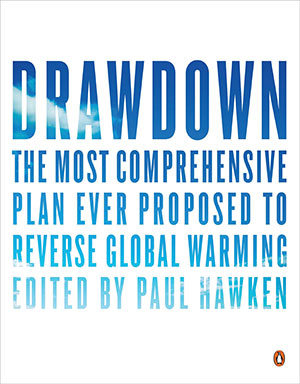 Paul Hawken, ed.
Paul Hawken, ed.
Drawdown: The Most Comprehensive Plan Ever Proposed to Reverse Global Warming
Penguin Books
Drawing on over five thousand research studies and utilizing expertise from an extensive coalition of scientists, economists, politicians, architects, and engineers, Project Drawdown presents an inspiring assessment of one hundred potential methods by which we may be able to reverse global warming. Eighty of the solutions are clearly outlined, ranked by estimated efficiency, and evaluated in terms of net cost, savings, and the amount of greenhouse gases that could be reduced. Perhaps most intriguing is the sizable section dedicated to an additional twenty emerging innovations, from direct-air capture technologies and living buildings to microbial farming and repopulating the mammoth steppe. For all those who feel paralyzed by the prospect of climate change, this uplifting book serves as a beacon of hope and a clarion call to action.


